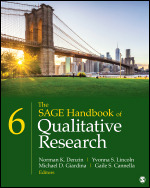質的研究ハンドブック(第6版)
The SAGE Handbook of Qualitative Research 6TH

Editors: Norman K. Denzin,University of Illinois, USA, Yvonna S. Lincoln,Texas A&M University, USA, Michael D. Giardina, Florida State University, USA & Gaile S. Cannella, Independent Scholar
6TH 2023:06 760 p. pap. ISBN 978-1-0718-3674-3 (Sage) -GB-
☆期間限定在庫特価10% OFF GBP 115.20(※弊社在庫分のみ2026/2/28まで適用)
Web販売価格 ¥28,675 / 標準価格 ¥38,579
通常価格 GBP 133
Web販売価格 ¥29,932 (税込) / 標準価格 ¥40,232 (税込)
*特価適用は弊社在庫に限り、在庫が完売しお取り寄せになる場合は通常価格に戻りますので、ご了承ください。
*2025年9月30日時点の価格です。実際の価格は、為替レートや出版社の都合により変動いたしますので、最新の価格は以下オンラインストアリンクをご参照ください。
*Web販売価格は、紀伊國屋書店BookWeb Proでご注文され、付帯作業を伴わない納品を行い、弊社標準書式による請求書を発行し遅滞なくお支払いただく場合、あるいは、クレジットカードでお支払いいただく場合に適用される販売価格です。
概要
質的研究法は、社会学、保健、看護、心理学、教育学、応用言語学などの幅広い分野で用いられます。常に新たにして多様な対象と向き合うその実践の最前線はどうなっているでしょうか?
本書は、約30年も版を重ねている、質的研究の最も権威あるハンドブック(第2版は邦訳あり)の6年ぶりの新版です。初版以来のデンジン&リンカンに新たな編者2名が加わり、生まれ変わった第6版は、質的研究の歴史、理論、実践に関する最新の知見を示します。全34章は全く新たに執筆された27章を含み、交差性、批判的障害学、ソーシャルメディア研究法、テーマティック・アナリシス法、公衆衛生とCOVID-19、質的研究の出版、アカデミック・サバイバルなどの旧版にはなかったトピックを取り上げます。
人文・社会科学分野のあらゆる学生・研究者の間で共有できるリソースとして、おすすめいたします。
*前版The SAGE Handbook of Qualitative Research, 5th Edition (2017) (ISBN 9781483349800)
価格照会・ご購入
※本件についてのお問い合わせ、お見積りについては最寄りの紀伊國屋書店営業所もしくはこちらまでお願いいたします。
内容明細
Introduction: The Discipline and Practice of Qualitative Research (Norman K. Denzin, Yvonna S. Lincoln, Michael D. Giardina, and Gaile S. Cannella)
Part I: Locating the Field
1: A History of Qualitative Inquiry in Social and Educational Research (Frederick Erickson)
2: Ethics, Research Regulations, and Critical Qualitative Science (Gaile S. Cannella and Yvonna S. Lincoln)
3: Paradigmatic Controversies, Contradictions, and Emerging Confluences, Revisited (Yvonna S. Lincoln, Susan A. Lynham, and Egon G. Guba)
4: The quality of relationships: An exploration of current Leader-Member Exchange (LMX) research and future possibilities (Allan Lee, Cat Holt)
Part II: Philosophies of Inquiry
5: Feminist Inquiry (Bronwyn Davies)
6: Critical Race Theory and the Postracial Imaginary (Jamel K. Donnor and Gloria Ladson-Billings)
7: Intersectionality Methodology: A Qualitative Research Imperative for Black Women’s Lives (Chayla Haynes, Saran Stewart, and Lori D. Patton)
8: Queer/Quare Theory: Worldmaking and Methodologies (Revisited) (Bryant Keith Alexander)
9: Critical Disability Studies and Diverse Bodyminds in Qualitative Inquiry (Emily A. Nusbaum & Jessica Nina Lester)
10: Critical Post-Intentional Phenomenological Inquiry (crit-PIP): Why it Matters and What it Can Do (Mark D. Vagle, Keitha-Gail Martin-Kerr, Jana LoBello Miller, Bisola Wald, & Hazen Fairbanks)
11: Why We Do Indigenous Methodologies: Contemplations On Indigenous Protocol, Theory and Method (Sweeney Windchief, Timothy San Pedro, and Margaret Kovach)
12: Postcolonial and Decolonized Knowing: Speaking “Nearby”: A Letter to Rekha (Devika Chawla)
13: Poststructural Engagements (Aaron M. Kuntz)
14: Agential Realism, Intra-Action, and Diffractive Methodology (Serge F. Hein)
Part III: Practices of Inquiry
15: Examining the ‘inside lives’ of research interviews (Kathryn Roulston)
16: Observation in a Surveilled World (Jack Bratich)
17: Ethnographic Futures: Embodied, Diffractive, and Decolonizing Approaches (Michael D. Giardina and Michele K. Donnelly)
18: Critical Situational Analysis after the Interpretive Turn (Adele E. Clarke, Carrie Friese & Rachel Washburn)
19: Thematic Analysis (Virginia Braun and Victoria Clarke)
20: Qualitative Social Media Methods: Netnography in the Age of Technocultures (Robert V. Kozinets and Ulrike Gretzel)
21: Autoethnography as Becoming-with (Tony E. Adams and Stacy Holman Jones)
22: Performance Shapes for Qualitative Inquiry (Johnny Saldaña)
23: The Arts as Research: Nomadic Materiality and Possible Futures (Richard Siegesmund)
24: Communicative Methodology: Working Together with the Roma Community for Improving Their Lives (Aitor Gómez Gonzalez)
25: Betweener Autoethnographies: Collaborative Inquiry from the Borderlands (Claudio Moreira and Marcelo Diversi)
Part IV: Within: Leadership as a Contextually Bound Phenomenon
26: Qualitative Inquiry and Public Health Science: Case Studies from the COVID-19 Pandemic (Trisha Greenhalgh and Ama de-Graft Aikins)
27: Science, evidence and the development of policy and practice: Can Qualitative Research Make a Different Contribution? (Harry Torrance)
28: Co-production and Impact: Challenges and Opportunities (Brett Smith and Kerry R. McGannon)
29: The Elephant in the Living Room, or, Extending the Conversation about the Politics of Evidence, Part 2 (Norman K. Denzin)
30: Backsliding Toward Illiberal Democracy & Authoritarianism: Qualitative Inquiry, Academic Freedom, and Technologies of Governance (Marc Spooner)
Part V: Into the Future
31: Academic Survival: Qualitative Researchers in the Neoliberal Academy (Julianne Cheek)
32: Publishing and Reviewing Qualitative Research (Mitchell Allen)
33: Qualitative Inquiry and Posthuman Futures: Justice and Challenging the Human/Nonhuman Life Dichotomy (Mirka Koro and Gaile S. Cannella)
34: The Future of Qualitative Research (Norman K. Denzin, Yvonna S. Lincoln, Michael D. Giardina, and Gaile S. Cannella)
(学術洋書部)